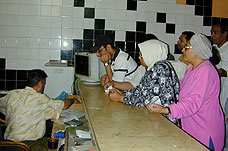|
|
|
To
wait and talk
It was the last
day to pay, and yet another first in the ever-increasing billing cycle.
by Tarek Atia
(cairolive.com,
May 10, 2002)
Telephone offices and other outlets where
people
can pay their phone bills were running a brisk business yesterday as
a great deal of folks had -- predictably -- waited until the last
allowable day before a late penalty is added, to pay their bills.
In some places, like
the Shams Club, the line slunk out the door. For many, the most
noticeable thing about their bills this time around was that they were
lower than usual -- normal, considering it was only three months worth
of phone calls. But the frequency of upcoming payments probably still
hadn't set in. Whereas phone
bills used to be a once a year affair, recent years have seen that
cycle get gradually smaller, heading towards the
monthly payment system so standard everywhere else.
 That
may certainly be one of the goals of the major transformation currently
going on within the telephone system's entire billing process. There
have been fundamental shifts both in terms of the way bills
are calculated, and the way payments are delivered. That
may certainly be one of the goals of the major transformation currently
going on within the telephone system's entire billing process. There
have been fundamental shifts both in terms of the way bills
are calculated, and the way payments are delivered.
Billing
cycles have evolved -- via a somewhat confusing bi-annual revolving
system of payments depending on whether your phone number ended in odd
or even digits -- into a universal three-month stage. The way phone calls are
calculated, as well, has matured. A six minute unit has
been divided up into single minutes, with critics on either side arguing
the merits of the different systems. No matter, the new system looks
here to stay and it does cost a little more on average.
People are more wise
now to how much it costs to call mobiles, to order songs and download
ringer melodies, and they know exactly how much they're paying per hour
to use the "free" internet. With bills arriving more
frequently, that consumption can be more easily monitored, and adjusted
by consumers in real time.
It also helps the
phone company discern trends in customer behavior, and brings in a much
steadier cash flow.
Standing in line at
the phone company to pay the bill every month should not really be part
of the equation. You can pay on line, but it hasn't really caught on in
a big way. You can also pay via certain cash machines, or have someone pick
up the money from your door, for a slight charge. There are a lot of
options. But inevitably, people end up waiting until the last day and
gathering at the telephone office.
To wait and talk.
WHAT
DO YOU THINK?

MAKE YOUR
VOICE HEARD
Send a comment to cairolive.com

Disclaimer
and Terms of Use
© Copyright 1996-2005 cairolive.com. All Rights Reserved
|
|

Read
Tarek Atia's web log
Find
out how
the world media sees Egypt...
UPDATED DAILY!

The ultimate
East-West
world-view

Instant Arabic headlines
|
|